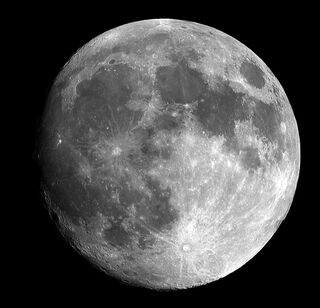Persuasion
Can the Moon Influence Our Emotions?
The moon has the power to inspire, but can it alter the mind, too?
Posted June 27, 2022 Reviewed by Davia Sills
Key points
- The moon has long been credited with the power to inspire creativity and stir up powerful emotions.
- It has also been linked to madness and aggressive behavior.
- However, there is no conclusive evidence that the phases of the moon actually affect human thought and behavior.
Countless artists, from Emily Dickinson to Debussy and Beethoven, have found inspiration in the moon. Its power to stir emotions may be related to our belief that it may also be able to alter our minds.
Until not so long ago, people used the word lunatic (from the Latin luna meaning "moon") to refer to a mentally ill person, and we still use it in its figurative sense. The word "loony" is derived from it and used as an insult, particularly in the British press. Many still think that our satellite has the power to induce mental instability.

Two different theories are typically put forward as possible explanations:
The first and most popular is related to the power of the moon to influence tides. According to this theory, the moon affects the water in our body and brain with its gravitational force, altering its functioning in much the same way that it pulls the water in the seas during the tidal cycles. However, the moon's gravity seems to be interested only in oceans and not in the tiny bodies of water found in our organs, which remain inert whether it is a full moon or a new moon.
The second theory is more convincing. It relates to the light emitted by the moon (reflected from the sun, rather than emitted, to be precise), the same light that has inspired poets through the ages. In the old days, asylums were usually built in the countryside or on the outskirts of cities, where until the arrival of artificial light, total darkness reigned at night. Unless there was a full moon, of course. The light of a full moon, long before effective psychiatric treatments had been invented, would have encouraged the residents in the asylum to stay awake, robbing them of their sleep and decompensating their fragile mental state. It is distressing to read that in some asylums, residents were chained to the wall during the full moon phase to prevent them from attacking each other.
The myth of lycanthropy (the werewolf) is also related to the moon and its power to transform a placid person into a fierce wolf. Paracelsus, the celebrated 16th-century physician, saw the moon as an agent of passions, hallucinations, and nightmares.
Other things that have been claimed to be subject to the influence of the moon include aggression, crime, and, of course, menstruation. There are those who believe that dogs and cats have more veterinary emergencies when there is a full moon, and a study of the stock market in 48 countries, published in the Journal of Empirical Finance, concluded that profits were smaller on full moon days than on new moon days. Police in Brighton, in the south of England, decided some time ago to put more bobbies on the street when there is a full moon in order to better control the public perception of higher rates of erratic behavior.
Disappointingly perhaps, the truth is that most empirical studies have shown that Paracelsus was wrong. The moon doesn't really induce mental illness, and it certainly doesn't turn us into werewolves. And despite recent claims I have found in a popular newspaper, the phases of the moon have nothing to do with our levels of happiness, which, as readers of this blog know, is a very ethereal concept anyway, like the moonlight itself, I suppose. This faint and romantic light doesn't incite us to attack anyone either, and I strongly suspect that it is totally unrelated to stock exchange profits.
For Oscar Wilde, the reflection of the full moon on the dark water of the night was the very definition of beauty. The moon certainly inspires us, but it doesn't alter our minds.


